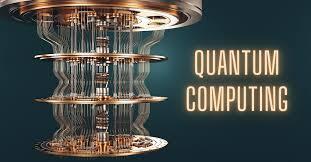Quantum Computing: The Next Frontier in Computer Science

The technology has advanced from the edge of transistors to the internet and then the transformation of the internet to Artificial Intelligence; each span of computer science is shaped by the new revolution. At present, a new movement is emerging and ready to set the innovation into the technology in all ways, so we have started to think: Quantum Computing!
Beyond Classical Computing
For the last 4-5 decades, classical computers have been set towards the progress of humans. However, challenges are growing rapidly with more complexity, and classical computers are reaching their limits. Quantum computing ensures a new step ahead with the capability to resolve these tasks in minutes rather fastest supercomputer of today might take hundreds of years to resolve. Qubits(quantum bits), unlike bits ‘0’ and ‘1’, can exist in multiple states at the same time, rendering possibilities of enormous parallel processing and unlocking the extraordinary potential of Quantum computers.
The Quantum Revolution in Computing
Quantum computing has a wide scope of manoeuvring rather than a single scientific concept with its four verticals: Quantum Computing, Quantum Communication, Quantum Sensing, and Quantum Materials. It is a genuine quantum leap with lots of experiential applications:
Cybersecurity and Communication:
Quantum computing has been employed in several real-world applications; rebuilding the industrial manufacturing and society. In cybersecurity, Quantum approaches Shor’s algorithm with the potential to break RSA-encrypted ciphertexts, also quantum cryptography enhances the level of security during surfing and provides a hacking-free platform on the internet.
Artificial Intelligence and Environment:
Quantum machine learning models stand to benefit artificial intelligence and the environmental climate accurately. Further, Quantum simulation on atomic molecules is approaching the search for new medicine, material exploration-invention, and it is more efficient for sustainable materials, unlike photovoltaic cells and rubidium, etc., superconductors.
Healthcare and Life Sciences:
In the healthcare sector, a quantum computing-based model is involved in drug-discovery investigation using quantum materials. Currently, these supporting quantum models are also involved in the designing of typical medical diagnostic machines (revolutionary change in the medical diagnostic equipment such as, Cancer detection Biopsy, MRI, CT Scan, digital ultrasound etc.).
Materials and Energy Systems:
The energy power system is followed by the sensational Quantum algorithms to the manufacturing of battery with robust design, together with the planning to store the energy.
Industry and Smart Systems:
In cyber physical system, we implement these quantum model for energy harvesting in smart grid system. Industry 4.0 is changing over to Industry 5.0 through smarter production, processing section, inventory and supply chain units by using Grover’s / Deutch’s algorithm. Now, industries are running smoother with decision making, transportation and thereof finance. A dream for the smart city has reached out.
Opportunities
In the shade of Noisy Intermediate Scale Quantum, Quantum computers are significant, but it is not an absolute one. There are some barriers such as changes in temperature lead to the decoherence (where qubits' states become unstable with rising or falling temperatures) in the quantum computer. In addition, interference during entanglement and then error corrections are some related issues rendering the challenge. Quantum computers work at -273.15 degree/0 kelvin, so it is temperature dependent. However, every evolution starts with some shortcoming; unlike previous computer, whichs had sizes in hundreds of sq. feet, it was later replaced by tablets and smartphones. It can be realized that each technology learns with its challenges and becomes revolutionary.
Innovations
Presidency University, Bengaluru, has set up a laboratory for Quantum technology (QT00-QT08) and is launching interdisciplinary UG/PG courses with a minor in Quantum Technology. Presidency University is shaping the next generation of innovators, researchers, and faculty who will lead the progress in quantum technologies globally, through specialized curriculum, research plan, Govt projects, and continuity with the National Quantum Mission (NQM) of India. It fulfils its vision “Gain More Knowledge, Reach Greater Heights”. It is closely connected to the future of Quantum technology.
The university keeps a strong research profile in Engineering and Technology with NIRF and NAAC accreditation in the background. Now, the evolution of the Quantum era and its verticals has added feathers to its cap. All four verticals, Quantum Computing, Quantum Sensing, Quantum Materials, and Quantum Communication, are appropriately mapped with all interdisciplinary courses initiated in the Presidency School of CSE& IS, School of Engineering, and Presidency School of Management.
Regular workshops/Seminars/FDPs encourage students and faculties to embrace the vision of “Atmanirbhar Bharat-Digital India to Quantum India”. Students are being capable of thinking beyond the Classical Computers: Hello world! To Quantum Computers: Hello Quantum! Faculties are also involved continuously and rigorously in the development of new applications and algorithms using Qiskit/Scikit under the IBM Quantum platform ensuring that Presidency University remains at the forefront of quantum innovation in the near future.
A Mission towards the Future
“Nature is not classical, and if you want to simulate the nature, you must make it quantum mechanical”
This statement has become true, said by the famous physicist, scientist, and Nobel laureate Sir Richard Feynman. Presidency University shares this vision with passion, and preparing its community not only to witness the quantum revolution but actively to shape it. The future will belong to those who are ready to imagine, innovate, and explore with the capability of Quantum technology.
Written by,
Dr. Anand Prakash
Associate Professor, Presidency School of Computer Science & Engineering













 Rajanukunte, Yelahanka, Bengaluru, Karnataka, Pin: 560119, India
Rajanukunte, Yelahanka, Bengaluru, Karnataka, Pin: 560119, India
 +91 9022092222
+91 9022092222